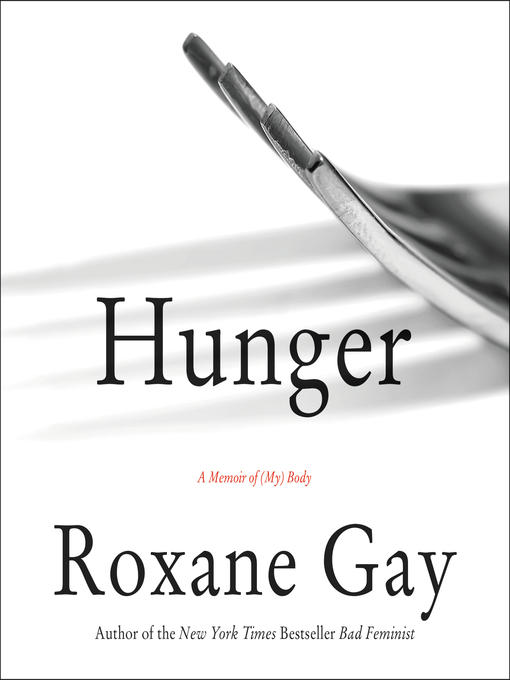
Hunger
A Memoir of (My) Body
کتاب های مرتبط
- اطلاعات
- نقد و بررسی
- دیدگاه کاربران
نقد و بررسی

There's no better person to narrate this audio than Roxane Gay herself. Her calm, consistent inflections are juxtaposed with the content of the audiobook, which unfolds her conflicts about her body, both from external and internal perspectives. Her narration is filled with careful intentions--as if every single word stated and not stated explains her existence spatially. She analyzes terms like "obese" and being a "victim" versus a "survivor" of rape. She is repetitive in her sharing. And it's painful to listen to but necessary. She creates safe spaces the best way she knows how--unhealthy or not. Most of all, her story is felt because content and narration explore the concept of un/control of the body, self, and existence through her voice. T.E.C. � AudioFile 2017, Portland, Maine

September 1, 2017
For such a vulnerable, raw memoir, no one but the author could voice the breathtaking revelations, brutal truths, and profound knowledge contained here. "Every body has a story and a history," Gay (Bad Feminist, Difficult Women) begins. Gay stands 6'3"; at her heaviest, she weighed 577 pounds. The daughter of Haitian immigrants who was raised upper-middle-class, Gay was smart, privileged, loved, and thin, like the rest of her family. Until she wasn't: "What you need to know is that my life is split in two...there is the before and after. Before I gained weight. After I gained weight. Before I was raped. After I was raped." Weight protected her, until her corpulence became a "cage" from which Gay attempts to write herself free: "This is a book about learning...to allow myself to be seen and understood." VERDICT Gay calls this work "the most difficult writing experience of [her] life"; audiences are likely to find Hunger a difficult--yet rewarding--experience, as well. ["Displays bravery, resilience, and naked honesty from the first to last page": LJ 6/1/17 starred review of the Harper hc.]--Terry Hong, Smithsonian BookDragon, Washington, DC
Copyright 2017 Library Journal, LLC Used with permission.

May 13, 2013
When Austin (Peregrino) was inducted into the College of Fellows at the Dominican School of Philosophy and Theology in Berkeley, Calif., he described himself as a survivor “from a strange and mythic land called Hollywood.” Austin organizes his life into three parts. In act one, Austin name-drops along his Hollywood road—with an analysis of Judaism in show biz, partially instigated by his Jewish wife. His movie and television days brought him into contact with stars, including Charlie Chaplin, whom he particularly admired. Austin was later blacklisted, having been a member of the Young Communist League during his college days. Despite his later success, Austin wanted something even beyond his career and marriage. Act two tells of his religious conversion and service as a Roman Catholic lay minister, working as a prison chaplain, “touching glass” to say hello to convicts. Act three expresses wisdom: widowed and nearly blind, Austin thinks on the convergence of
Judaism and Christianity—not assimilation, not synthesis, not conversion, “but an integrated understanding of the past.” His seasoned thoughts about convergence matter the most.

Starred review from May 15, 2017
A heart-rending debut memoir from the outspoken feminist and essayist.Gay (Bad Feminist, 2014, etc.) pulls no punches in declaring that her story is devoid of "any powerful insight into what it takes to overcome an unruly body and unruly appetites." Rather than a success story, it depicts the author, at 42, still in the throes of a lifelong struggle with the fallout from a harrowing violation in her youth. The author exposes the personal demons haunting her life--namely weight and trauma--which she deems "the ugliest, weakest, barest parts of me." Much of her inner turmoil sprang from a devastating gang rape at age 12. "I ate and ate and ate in the hopes that if I made myself big, my body would be safe," she writes. Gay painfully recalls the "lost years" of her reckless 20s as a time when food, the anonymity of the internet, and creative writing became escapes and balms for loneliness. The author refers to her body as a "cage" in which she has become trapped, but her obesity also presents itself as a personal challenge to overcome the paralyzing psychological damage caused by rape. Broken into clipped, emotionally resonant chapters, Gay details a personal life spent grappling with the comfort of food, body hyperconsciousness, shame, and self-loathing. Throughout, the author is rightfully opinionated, sharply criticizing the media's stereotypical portrayal of obesity and Oprah Winfrey's contradictory dieting messages. She is just as engaging when discussing her bisexuality and her adoration for Ina Garten, who taught her "that a woman can be plump and pleasant and absolutely in love with food." Gay clearly understands the dynamics of dieting and exercise and the frustrations of eating disorders, but she also is keenly in touch with the fact that there are many who feel she is fine just as she is. The author continues her healing return from brokenness and offers hope for others struggling with weight, sexual trauma, or bodily shame. An intense, unsparingly honest portrait of childhood crisis and its enduring aftermath.
COPYRIGHT(2017) Kirkus Reviews, ALL RIGHTS RESERVED.

























دیدگاه کاربران